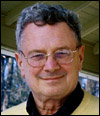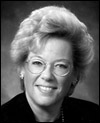Medalists honored for lifetime work by GSAS
Daniel Callahan
An ethicist whose work has had a major impact on medical policy, an astronomer who uncovers secrets of distant galaxies, a Nobel Prize-winning economist who has proposed challenging theories of economic growth, and a writer whose many books have established him as the foremost historian of California received the Graduate School of Arts and Sciences Centennial Medal on Wednesday (June 7) at the Harvard Faculty Club.
The medalists are: Daniel Callahan, Ph.D. ’65, philosophy; Sandra Faber, Ph.D. ’72, astronomy; Robert Solow, Ph.D. ’51, economics; and Kevin Starr, Ph.D. ’69, English and American literature and language.
Daniel Callahan

Callahan was a co-founder of the medical ethics think tank the Hastings Center in 1969. Today he is director of its international programs and is working on a project on medicine and the market, specifically, the impact of market theory and practice on health care systems, with a special focus on issues of equity and health care costs.
Callahan is also a senior fellow at the Harvard Medical School, directing its ethics track. He is a member of the Institute of Medicine, National Academy of Science; the director’s advisory committee, Centers for Disease Control; and a former member of the advisory council, Office of Scientific Integrity, U.S. Department of Health and Human Services. He won the 1996 Freedom and Scientific Responsibility Award of the American Association for the Advancement of Science.
Callahan is the author or editor of 36 books, including “The Research Imperative: What Price Better Health?,” “False Hopes,” “The Troubled Dream of Life: In Search of a Peaceful Death,” and “What Kind of Life: The Limits of Medical Progress.”
Sandra Faber

Faber is a University Professor of Astronomy and Astrophysics at the University of California, Santa Cruz, and an astronomer at the University of California’s Lick Observatory. She is the discoverer of the “Faber-Jackson relation” linking the brightness of elliptical galaxies to the speeds of stars orbiting within them. Her work with the Hubble Space Telescope focuses on the centers of galaxies, which often harbor massive black holes, according to evidence gathered by her team.
She has made significant contributions in the areas of structure and formation of elliptical galaxies; the nature, composition, and motion of stars within a galaxy as related to their ages; and the streaming motions of large numbers of galaxies. Important concepts such as “cold dark matter” and the “Great Attractor” are direct results of work by Faber and her colleagues.
Faber was one of three scientists who diagnosed a flaw in the Hubble’s mirror and later helped craft the strategy for a successful repair mission. She is a member of Hubble’s wide field/planetary camera team, which directs many of the telescope’s most striking observations.
In addition, for nearly two decades Faber has helped plan and develop the Keck Observatory in Hawaii, home to the world’s largest optical and infrared telescopes. She is a member of the National Academy of Sciences and the American Academy of Arts and Sciences.
Robert Solow

Solow is Institute Professor Emeritus and Professor of Economics Emeritus at the Massachusetts Institute of Technology (MIT). He was awarded the John Bates Clark Medal in 1961, and won the Nobel Prize for Economics in 1987 for his contributions to the theory of economic growth.
Solow is one of the major figures of the Neo-Keynesian Synthesis macroeconomics. Together with Paul Samuelson, he formed the core of the MIT economics department, which has been widely viewed as the “mainstream” of the postwar period. Solow and Samuelson contributed to landmark studies on von Neumann growth theory, capital theory, linear programming, and the Phillips curve.
Individually, Solow is best known for his work on the Neoclassical growth model. His use of an aggregate production function launched the Cambridge capital controversy, which pitted Solow and Samuelson against Joan Robinson and the Cambridge Keynesians in a debate on the nature and role of capital goods on the means of production.
Solow also became embroiled with Nicholas Kaldor on the issue of growth and technological progress. He was one of the co-inventors of the constant elasticity of substitution production function and is responsible for exploring and popularizing the “long-run multiplier” derived from a dynamic government budget constraint.
Kevin Starr

Acknowledged as the leading historian of California, Starr is a University Professor at the University of Southern California, the California state librarian emeritus, and former chief executive officer of the California Library Services Board/Library of California.
Starr’s research focuses on California history, the history of American culture, and urban history. His 1973 book “Americans and the California Dream: 1850-1915” captures the enigmatic blend of dreams and hardscrabble reality that defines California.
His many books include “Embattled Dreams: California in War and Peace, 1940-1950,” “Coast of Dreams: California on the Edge, 1990-2003,” and “California: A History.” Starr is a contributing editor to the Los Angeles Times, and his many honors include two Guggenheim Fellowships and a Lifetime Achievement Award from PEN.




